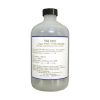YSI 1006 Nitrate (ISE) Sensor
Add the YSI 1006 nitrate ISE sensor to a Pro Series multi-parameter instrument to complement individual sampling regimen.
Features
- Freshwater use only
- Best for sampling applications
- Field-replaceable
- Free ground shipping
- Expedited repair and warranty service
- Lifetime technical support
- More
Overview
The YSI 1006 nitrate ISE sensor consists of a silver/silver chloride wire electrode in a custom filling solution. The internal solution is separated from the sample medium by a polymer membrane, which selectively interacts with nitrate ions.
Mechanics
When the probe is immersed in water, a potential is established across the membrane that depends on the relative amounts of nitrate in the sample and the internal filling solution. This potential is read relative to the Ag/AgCl reference electrode of the instrument pH probe. As for all ISEs, the linear relationship between the logarithm of the nitrate activity (or concentration in dilute solution) and the observed voltage, as predicted by the Nernst equation, is the basis for the determination.
- 6-month warranty
In The News
Kansas State classes get a lesson in environmental remediation
Kansas State University professors transformed a plot of land from a problem to a classroom, teaching students on the fly to remediate nutrient pollution. Saugata Datta, an associate professor of geology, and Nathan Nelson, an associate professor of agronomy, taught students to evaluate, sample and remediate land using Kansas Department of Health and Environment protocols. It started when Chris Steincamp, an environmental lawyer and KSU alumnus, asked Datta if his geology students could restore a tract of land in Sylvan Grove Kan. Datta jumped at the opportunity to give his students hands-on experience in a process usually reserved for regulators and consultants. It helped that O.C.
Read MoreChoptank River watershed nitrate monitoring targets conservation efforts
A nutrient monitoring effort throughout a degraded Chesapeake Bay watershed is helping chart the path of nitrate through the system. The monitoring is part of a plan to target federally funded agricultural conservation practices to the places in the watershed that need them most. The Choptank River is among one of the largest tributaries to the Chesapeake Bay, a system plagued by excess nutrients. The Choptank flows across the Delmarva Peninsula, a 170-mile-long piece of land that makes up the bay's eastern shore. More than half of the Choptank's watershed is covered in agricultural land, which is part of the reason the river has been listed as impaired under Clean Water Act standards for nutrients and sediment.
Read MoreSupplying Seattle’s Drinking Water: Using Data Buoys to Monitor the Cedar River Municipal Watershed
Providing clean, safe, and reliable drinking water for the 1.6 million people in the greater Seattle area is a top priority for Seattle Public Utilities (SPU). With limited water supplies, SPU dedicates considerable resources to maintain its watersheds and mountain reservoirs. About 70 percent of Seattle Water comes from the Cedar River Municipal Watershed , and the other 30 percent comes from the South Fork Tolt River Watershed . [caption id="attachment_39574" align="alignnone" width="940"] Data buoy in Chester Morse Lake . (Credit: Kevin Johnson / Seattle Public Utilities) [/caption] Jamie Thompson, a fisheries biologist at SPU, monitors aquatic ecosystems centered on fish listed under the U.S. Endangered Species Act (ESA).
Read More









